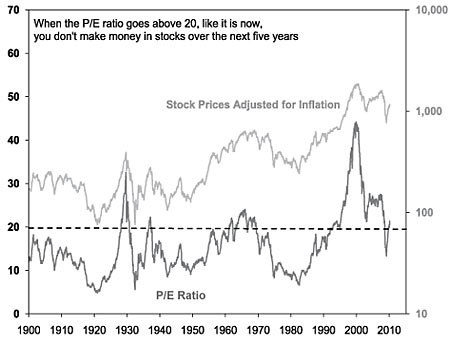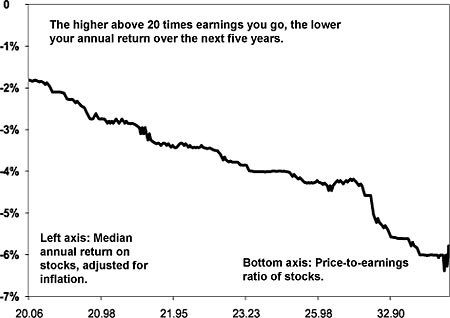Get the latest financial news, insights and expert analysis from our award-winning MoneyWeek team, to help you understand what really matters when it comes to your finances.
You are now subscribed
Your newsletter sign-up was successful
Want to add more newsletters?

Twice daily
MoneyWeek
Get the latest financial news, insights and expert analysis from our award-winning MoneyWeek team, to help you understand what really matters when it comes to your finances.

Four times a week
Look After My Bills
Sign up to our free money-saving newsletter, filled with the latest news and expert advice to help you find the best tips and deals for managing your bills. Start saving today!
What are you getting for your money in stocks today? Sure, the market is way up and investors are excited. But what's the outlook over, say, five years?
To spare you the suspense, the outlook is not good.
Legendary investor Jeremy Grantham called the top in the markets in 2000 (like no one else). Then he backed up the truck and bought stocks at the very bottom in March 2009.
MoneyWeek
Subscribe to MoneyWeek today and get your first six magazine issues absolutely FREE

Sign up to Money Morning
Don't miss the latest investment and personal finances news, market analysis, plus money-saving tips with our free twice-daily newsletter
Don't miss the latest investment and personal finances news, market analysis, plus money-saving tips with our free twice-daily newsletter
Today, he is forecasting that the big U.S. stocks will return 0.4% a year over the next seven years. Assuming inflation of 2.5% per year, if Grantham is right, on an inflation-adjusted basis you will lose about 2% a year over the next seven years by investing in the stock market today.
I crunched the numbers differently and came to the same conclusion. Here's the simple way to see it:
Companies on the stock market are selling for over 22 times earnings today. Would you buy a business if it would take 22 years to get your money back?
More onstockmarketsWhat to buy when markets look expensiveThe US tech sector is booming and it's cheap
Well, that's the way it is in the stock market right now. If you were buying a company today, it would take you over 20 years to make your investment back through company earnings (if earnings stayed flat).
As you might guess, that's not a good deal. History backs up this thought. Since 1900, it's been a bad idea to buy stocks when they're trading at 20 times earnings or higher. Take a look at the chart below. You can see what I'm talking about throughout history. Stocks traded over 20 times earnings in 1929 and in the late 1960s and then in the mother of all stock market peaks in 2000.

We have nearly 110 years of history to go on here, from Yale professor Robert Shiller. And the historical record shows you don't make money buying stocks above 20 times earnings.
In fact, when you break the numbers down, you find this: the higher above 20 times earnings you go, the less money you make over the next five years. Take a look:

The chart shows what you can expect to make in stocks five years after the P/E ratio hits 20 or higher. Specifically, it's the median annualised returns five years later.
Now, this chart is extremely conservative. I adjusted for inflation and I ignored dividend income. But even if you don't do that, the returns look terrible.
I used a different method to arrive at my numbers than Jeremy Grantham did. But the results were the same You don't make money over the long run when you buy stocks as expensive as they are today.
While stocks are this expensive, trade carefully, with one eye on the exits. Think more about good defence than good offence. Good defence is doing things like tightening your trailing stops, selling positions that you know are overpriced, and shrinking the size of your bets.
At these lofty prices, the outlook for stocks in general isn't good. Invest accordingly.
This article was written by Dr. Steve Sjuggerud for the free daily investment letter DailyWealth
Get the latest financial news, insights and expert analysis from our award-winning MoneyWeek team, to help you understand what really matters when it comes to your finances.
MoneyWeek is written by a team of experienced and award-winning journalists, plus expert columnists. As well as daily digital news and features, MoneyWeek also publishes a weekly magazine, covering investing and personal finance. From share tips, pensions, gold to practical investment tips - we provide a round-up to help you make money and keep it.
-
 How a ‘great view’ from your home can boost its value by 35%
How a ‘great view’ from your home can boost its value by 35%A house that comes with a picturesque backdrop could add tens of thousands of pounds to its asking price – but how does each region compare?
-
 What is a care fees annuity and how much does it cost?
What is a care fees annuity and how much does it cost?How we will be cared for in our later years – and how much we are willing to pay for it – are conversations best had as early as possible. One option to cover the cost is a care fees annuity. We look at the pros and cons.

